
Tri-Institute Physician
Fellowship in Climate Change and Human Health
BethIsrael Deaconess Medical Center
HarvardChan Center for Climate, Health, andtheGlobal Environment
Francois-Xavier Bagnoud Center for Healthand Human Rights, at Harvard








Tri-Institute Physician
BethIsrael Deaconess Medical Center
HarvardChan Center for Climate, Health, andtheGlobal Environment
Francois-Xavier Bagnoud Center for Healthand Human Rights, at Harvard







SatchitBalsariMDMPH FellowshipDirector
AssociateProfessor, EmergencyMedicine, HarvardMedicalSchool
AssociateProfessor, GlobalHealthandPopulation, HarvardT.H.ChanSchoolof PublicHealth
Co-director,CrisisReady.io

CalebDresserMDMPH
AssistantFellowshipDirector
AssistantProfessor, EmergencyMedicine, HarvardMedicalSchool
AssistantProfessor, EnvironmentalHealth, HarvardT.H.ChanSchoolof PublicHealth
Climate Change is upon us, as increasing intensity and frequency of extreme weather events result in frequent health harms, population displacement, habitat destruction, and wage loss. The impact of climate change on human health is mediated through myriad pathways. Heatwaves, hurricanes, and floods cause direct bodily harm - but also impact population morbidity and mortality through prolonged interruptions in critical services and infrastructure, and through forced migration and loss of wages, among others. These phenomena also damage healthcare facilities, some permanently, especially in the poorest communities globally. Over longer time horizons, the changing climate will modify land-use patterns, crop cycles and human settlements; it will result in epidemiological shifts and the possible emergenceofnoveldiseases.
Physicians have a long track record of leading societal change. They have been at the forefront of raising awareness about and successfully banning landmines, instrumental in promoting nuclear disarmament, and played critical roles in detoxifying our environment from industrial pollutants. It is now time for physicians to step up again - to help patientsatthebedsideandthecommunitiestheylivein-tounderstand the impact of global climate change on their own health, on the lives of their loved ones, and on their communities. Dr Jay Lemery, one of the pioneers in our field at the intersection of climate change and human health, has long called for white coat diplomacy, rallying physicians to leadeffortstoaddressthecausesandimpactsofclimatechange.
TheClimateandHumanHealthFellowshipatHarvardisuniqueinmany ways. It is hosted at three institutions: Beth Israel Deaconess Medical Center(BIDMC),oneofHarvard’slargeacademicteachinghospitals;the Harvard FXB Center for Health and Human Rights, and the Center for Climate, Health, and the Global Environment at Harvard’s T.H. Chan School of Public Health. Our faculty advisors have a long history of engagement with vulnerable communities around the world, ranging from war-ravaged refugee populations in the Middle East to threatened coastalcommunitiesintheCaribbean.Webringtobearourexpertisein research and advocacy among populations impacted by disasters and war to the cause of protecting and promoting health as our climate changes. We hope to train a cadre of physicians dedicating themselves to research, policy-making and advocacy in the evolving healthcare and legislative landscape, tackling climate change domestically and internationally. We believe the health agenda for climate change is a renewed commitment to the yet unfulfilled promises of Alma AtaHealthforAll.
The Climate and Human Health Fellowship prepares physicians to become leaders in climate and human health research, education, communication, policy and advocacy.Thefellowshipprogramisoffered throughacollaborationbetweenBethIsrael DeaconessMedicalCenter,HarvardChanCCHANGE,andtheFXBCenterforHealthand HumanRightsatHarvard.
Fellows participate in core fellowship didactics, develop an area of individual focus,engageinoriginalacademicresearch, and receive mentorship from leaders in the field. Activities occur across Beth Israel Deaconess Medical Center and the Harvard T.H. Chan School of Public Health, with additional opportunities throughout the Harvardsystem.
Fellows work on research projects throughout their fellowship, and are mentored by a combination of faculty from our collaborating centers relevant to their focus area. Fellows receive guidance on conducting and publishing high quality research with significant translational potential. Our large pool of faculty mentors allows us to accommodate and support a wide range of research interests that incoming fellows may wish to pursue. Fellows have access to a wide range of resources on and off campus, including research services through the Harvard Library system, statistical support, and GIS trainingopportunities.
External placements and collaborations at governmentagencies,researchcenters,and nonprofitorcommunity-basedorganizations provide fellows with experiential learning, immersion in the communities they are advocating for, and participation in highleveldeliberationsinthecorridorsofpower.
Fellowsintheclinicaltrackworkpart-timein our Emergency Department at Beth Israel Deaconess Medical Center and at affiliated communitysites.Inadditiontofunctioningas an attending physician while in the Emergency Department, fellows may supervise residents in the BIDMC Harvard Affiliated Emergency Medicine Residency program and students at Harvard Medical School,dependingonthesitesatwhichthey practice.
Fellows receive mentorship from our core fellowshipfaculty,andhaveopportunitiesto connect with a wide range of experts at Harvardandbeyond.Interestedfellowsalso work closely with statisticians and data scientists throughout the duration of their fellowship.

Climatechangeisaffectingourentireplanet and everyone that lives on it, but some populations are facing particularly severe threats. The worst climate hazards often affectlocationswhereresourceswithwhich toprepareandrespondtoclimateshocksare limitedandthescientificevidencetosupport specific courses of action is still being developed.
Our faculty and fellows bring a global perspective to their work, which includes projects ranging from developing clinical guidelines for limited resource settings to analyzing healthcare utilization. Fellows havehadtheopportunitytoattendUNFCCC convenings, academic conferences, and stakeholder engagement workshops around theworld.

2019 Fellowship approvedby BIDMC

Climatehealth policyexternship
WashingtonDC

Firstfellow beginsthe program
Caribbean disaster conference



COVID-19 fieldhospital service

Heatstroke collaborative project
2020
Statehouse legislative briefing


First fellow graduates
2021
Brockton community heatworkshops
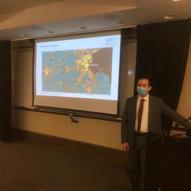
MysticRiver externship




Secondand thirdfellows arrive
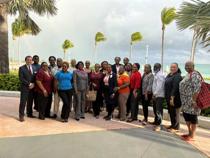

Second fellow graduates

Fieldwork inIndia

COP26 Glasgow WhiteHouse Climate&Health Forum
Bahamas GCCHE workshop
2022 2023

Stakeholder workshopin Manila
2024
CleanMed 2022

ResidentMD wastereduction project

BIDMC climatetalks

COP27 Egypt

Fourthfellow arrives
ACLA finalist
FirstclimateID fellow
Firstclimate disasterfellow




COP28 Dubai

Thirdandfourth fellowscomplete theprogram



1 year program
2 year program before fellowship
SupplementaryMaterialsto:DresserC, WiskelT,GiudiceC,HumphreyK,StorrL,BalsariS.AGraduateMedicalEducationFellowshipinClimate ChangeandHumanHealth:ExperienceandOutcomesFromtheFirst5Years.JournalofGraduateMedicalEducation,2024,inpress.
Ourfellowshaveconsistentlyincreasedtheir professional output across a variety of categories of activity while in the Climate and Human Health Fellowship. While the success of our fellows is about much more than their public-facing professional productivity, these outputs are nonetheless important milestones in their development, and can serve as important building blocks forasuccessfulcareerinacademiaorpublic service.
Fellows participating in our program have trackedtheirprofessionalactivitybeforeand after matriculating in the Climate Change and Human Health Fellowship. In the figure above,weshowthetotalnumberofresearch papers, opinion articles, grants, public talks, posters, presentations, media interviews, teaching, and other activities completed in eachsixmonthperiodforthreeyearsbefore andafterfellowshipmatriculation.

The Climate and Human Health Fellowship brings together faculty at Beth Israel Deaconess Medical Center, a Harvard teaching hospital, and academic centers includingHarvardChanC-CHANGEandthe FXBCenterforHealthandHumanRightsat Harvard. Ourprogramhasbeenshapedby the vision of our founding directors is now guidedbyfacultyadvisorsfromavarietyof disciplinesandinstitutions.
Our fellows have the opportunity to learn from teachers and mentors across a wide range of disciplines, and have access to a variety of staff including statisticians, data scientists, communications specialists, and professional educators. We have also welcomed graduate student affiliates onto our team, where they have completed research projects as a component of their graduatedegreeprograms.

Fellowship Director
AssociateProfessorofEmergencyMedicine
HarvardMedicalSchool
AssociateProfessor,GlobalHealth&Population
HarvardT.H.ChanSchoolofPublicHealth
Co-Director,CrisisReady.io
Caleb Dresser
TheBalsarilab(balsarilab.com)iscommittedto closing information asymmetries in vulnerable communities around the world, through research,trainingandadvocacy.Applyingnovel data streams, and digital health tools, Balsari’s researchhasresultedinarangeofpublichealth innovationsthatincludecloud-basedsyndromic surveillance systems deployed at the world’s largest mass gatherings, decision-support tools deployed at over 50 recent global disasters (crisisready.io/readymapper),andLLM-powered hyper-contextualized decision support tools for clinicians in the global south. He is currently lead investigator of the Community Heat AdaptationandTreatmentStrategiesprojectat Harvard’s Salata and Mittal Institutes, that maps the impact of heat on the health and wages of 1000 poor women workers most vulnerable to climate change. He has taught extensively at Cornell and Harvard on digital health,socialentrepreneurship,anddisasters.


Assistant Fellowship Director
Fellow(2019-2021)
AssistantProfessorofEmergencyMedicine
HarvardMedicalSchool
AssistantProfessor,EnvironmentalHealth
HarvardT.H.ChanSchoolofPublicHealth
Dr Dresser is a practicing emergency physician whose research focuses on understanding how climate change is affecting healthcare organizations and the patients they serve, and developing solutions to address these impacts. In addition to his work with our fellows, Dr Dresser serves as Director of Healthcare Solutions at Harvard Chan C-CHANGE, where his work includes evaluation and refinement of toolkits for patients, administrators, and clinicians, a pilot assessment of the use of targeted heatwave alerts for clinic staff, and adaptation of these resources to new settings. HeteachesaHarvardcourseonHumanHealth and Global Environmental Change for medical and graduate students and has lectured widely ontheimplicationsofclimatechangeforhealth, healthcare,andsocietalpreparedness.
FellowshipFaculty
Fellow(2022-2024)

InstructorofEmergencyMedicine HarvardMedicalSchool

ProgramCoordinator
DepartmentofEmergencyMedicine
BethIsraelDeaconessMedicalCenter
Dr. Wiskelisanemergencymedicinephysicianat Beth Israel Deaconess Medical Center in Boston andagraduateoftheClimateandHumanHealth Fellowship with a Master of Public Health from Harvard. She has centered her career on improvingcareforatriskpopulations,bothlocally and globally. During medical school and residency,sheconductedresearch,educationand advocacyfocusingonglobalandwomen’shealth, including developing an accident and emergency HIV testing program in Belize and an educational elective in reproductive health in emergency care. She is now a Burke Research Fellow at the HarvardGlobalHealthInstitute.
Ashley is a graduate of UMass Boston with a background in communications, marketing, and events. She joins the fellowship as a Program Coordinator after her time as a Communications Intern at University of Massachusetts Boston's SustainableSolutionsLab.
Mary Bassett

Faculty Advisor
Director,Francois-XavierBagnoud CenterforHealthandHumanRights
Professor,PracticeofHealthandHumanRights
HarvardT.H.ChanSchoolofPublicHealth

Faculty Advisor
ProfessorofEpidemiology, HarvardT.HChanSchoolofPublicHealth Co-Director,CrisisReady.io
Chris Golden

Faculty Advisor
DirectorofProgramonNutritionand PlanetaryHealth
AssociateProfessor,NutritionandPlanetaryHealth
HarvardT.H.ChanSchoolofPublicHealth

Faculty Advisor
DepartmentChairofEarthandPlanetary Sciences
ProfessorofEnvironmentalScienceand Engineering HarvardSchoolofEngineeringandApplied Sciences
Jay

Professor,EmergencyMedicine, UniversityofColoradoSchoolofMedicine Chief,SectionofWildernessand EnvironmentalMedicine
TheColoradoSchoolofPublicHealth

ProgramDirector,InfectiousDiseaseFellowship, BethIsraelDeaconessMedicalCenter
AssociateProfessor,Medicine HarvardMedicalSchool

Director,HarvardChanCenterforClimate, Health,andtheGlobalEnvironment MarkandCatherineWinklerAssociate ProfessorofEnvironmentalRespiratoryHealth

ChiefofEmergencyMedicine, BethIsraelDeaconessMedicalCenter
AssociateProfessorofEmergencyMedicine, HarvardMedicalSchool


Dr. Giudice is an emergency physician who joined the fellowship after completing her residency in Emergency Medicine at Los Angeles General Medical Center (former LAC+USC Medical Center) and medical schoolattheUniversityofColoradoSchoolof Medicine. Her current work focuses on understanding operationalization of climate preparednesswithinhealthcaresystems.She isevaluatingtheimpactsoftemperatureand air pollution on out-of-hospital cardiac arrests and emergency department acuity. SheiscurrentlyaguestresearcherattheUS Centers for Disease Control and Prevention (CDC), where she is focusing on projects to improvehealth duringextremeheat.
Dr. Rosenberg attended medical school at NYUbeforejoiningBIDMCforresidencyand chiefresidency.Hisresearchinterestsareat the intersection of infectious disease and climatechange.Hisrecentworkalsoincludes studying effects of heat exposure on readmission rates. He is excited to be pursuing the Climate Change and Infectious DiseasesTrackwithinthefellowshipprogram to further study its effect on vector-borne, water-borne,andzoonoticdiseases.

Dr. Latoya E. Storr, MBBS, is an Emergency MedicineSpecialistandConsultantPhysician intheAccident&EmergencyDepartmentat theRandMemorialHospitalontheislandof Grand Bahama in the Bahamas. Dr. Storr completedhermedicalschoolandresidency trainingattheUniversityoftheWestIndies and is an Associate Lecturer for the Emergency Medicine program at the University of the West Indies School of Clinical Medicine & Research in the Bahamas. She completed a Fellowship in Disaster Medicine in 2023 at Beth Israel Deaconess Medical Center and Climate and HumanHealthtrainingin2023-2024.

Dr.KimberlyHumphreyisasenioremergency medicinephysician,publichealthpractitioner, and a graduate of the Climate Change and HumanHealthFellowship.AstheStateLead for Climate Change and Health for the GovernmentofSouthAustraliaandaClinical SeniorLecturerattheUniversityofAdelaide, she is responsible for creating and implementing mitigation and adaptation policyandactionforSouthAustralia’shealth system.DrHumphreyisaBoardmemberof Doctors for the Environment Australia and holds multiple national and international committee and board appointments in emergency medicine, public health, and climatechange.

NeilSinghisworkingwithourteamtostudy the operational implications of climateresponsive hazards using medical records andgeospatialdatasets.Hispastworkhas includedanalyzingtheexposureofhospitals in California to wildfires and analyzing the implicationsofclimatechangeforhealthcare in urban settings; his work has been published in the American Journal of Public Health.

Zilinworkedwithourteamtoassembledata on Emergency Department utilization and align it with local weather data from the National Weather Service. Her research helped identify relationships between heat andoperationallyrelevantEDmetrics.

Emma worked with our team to study the exposure of patients who use electricitydependent medical equipment to a locally relevant climate-responsive hazard, specifically storm surge flooding from hurricanes. Her research showing that a substantial number of patients who use home nebulizers live in areas at risk of flooding during future hurricanes was published in the Rhode Island Medical Journal.

Athanasiosworkedwithourteamtoanalyze the relationship between local weather conditionsandEmergencyDepartmentdaily arrivalvolumeatourmedicalcenterandled a project examining mortality in Portland during the 2021 heat dome. His work on mortality in Portland was published in Disaster Medicine and Public Health Preparedness, while his ED operations researchwasselectedfortheMasterScholar sessionatSAEM2023,andiscurrentlyunder reviewforpublication.



Research is a core component of our fellowship program. All fellows undertake scholarly works throughout the course of theirfellowshiptraining,andareexpectedto develop relevant skills and work with appropriate experts to complete their researchinarigorousmanner.
Collaboration across disciplines is a core element of the research experience. Our fellows have worked with data scientists, geographers, social scientists, disaster specialists, epidemiologists, and other experts to develop and conduct their research projects. The rich collaborative environment in which they work helps exposephysicianfellowstothecomplexities of adjacent fields and trains them to work acrossdisciplinaryboundaries.
Theprojectsundertakenbyeachfelloware selected carefully on the basis of their personal interests, professional goals, and regional focus in discussion with fellowship faculty.
Research projects by our fellows have includedanalysisofEmergencyDepartment utilization in relation to weather variables, surveysofmedicallyvulnerableindividualsin communities impacted by climate hazards, needs assessment surveys of healthcare workers, implementation assessments of ongoing projects, and development and testingofeducationalinterventions.


Climate change is leading to increasingly dangerous wildfires. Hot, dry summers with highwindsandwetwintersthatpromotethe growth of flammable vegetation mean that larger wildfires are threatening more people inmoreplaces.Whileotherfactorsincluding land use changes, settlement of wildland urban interfaces, human ignition sources, and other factors also play a role, there is substantial scientific evidence that wildfire willbeanincreasinghealththreatasclimate changeintensifies.
It is becoming increasingly important to understandhowwildfiresandwildfiresmoke impact patients, healthcare access, and the operations of healthcare systems - and how toprepareforandrespondtotheseevents.
Our fellows, faculty, and affiliated graduate students have worked on a wide range of projects related to wildfires and the threat they pose to health and health-care in our changingclimate.Startinginthefallof2019, our program began engaging with officials and public health professionals who were dealing with increasingly intense wildfires and related public safety power shutoffs in California. This led to development of a survey to understand how medically vulnerable patients are being affected by wildfires and related evacuations. A survey of older adults following the Oak Fire in California found that wildfires are leading to interruptions in regular medical care that patientsfeltwasaffectingtheirhealth.
Inparallel,othermembersofourteamhave examined what wildfires mean for human mobility and for healthcare facilities. Working with the team at CrisisReady (codirected by fellowship director Satchit Balsari), members of our program contributed to the development of the ReadyMappertoolandleadspatialanalyses ofthethreatposedbywildfirestohealthcare facilitiesinCalifornia.Thefirstcomponentof this analysis has been published in the AmericanJournalofPublicHealth.
More recently, our faculty and fellows have workedwithcollaboratorsatAmeriCaresto develop and expand resources for patients, providers, and healthcare administrators in primarycareandfreeclinicsthataredealing with the effects of wildfires and wildfire smoke.Theseresourcesincludeactionplans, tip sheets, and checklists for health professionals working to improve the readiness of their clinics for the impacts of wildfires on both their facility and their patients.


Dangerous heat is one of the preeminent concerns among medical and public health professionals who are studying and preparingfortheimpactsofclimatechange. Awarmerplanetmeansmoreextremeheat, a longer heatwave season, and in many cases higher humidity levels, all of which pose a substantial threat to human health. The frequency of heatwaves in major US cities has doubled since the 1960s; impacts in low and middle income countries are of even greater concern, as extreme temperatures, lack of worker protections, inadequate access to cool spaces, and in somecaseslimitedaccesstowatercombine tocreatealoomingpublichealthdisaster.
Our faculty and fellows are engaging with heatandheatrelatedillnessthroughawide varietyofactivities.Thesehaverangedfrom academic research to community engagement, policy, education, and the development of a toolkit and heat alert systemforhealthprofessionals.
Earlyworkonheatbymembersofourteam included collaborating with faculty and fellows at with the University of Colorado Climate Medicine program on a review and the development of a identification and management pathway for heat stroke patientsinemergencydepartmentsettings.
As the scale of the threat posed by heat in our changing climate has become clear, members of our program have devoted an increasing amount of effort to identifying, developing, and testing solutions that have thepotentialtohelpaverthealthharmsfrom extreme heat. Our work has focused on projects in the United States, India, and the Philippines.
Educational resources are one important approach. Public awareness of the threat posed by extreme heat remains limited in comparison to awareness of other climate hazardssuchasseverestormsandsealevel rise – yet heat is among the most immediately lethal health threats resulting from climate change, and the population exposed to dangerous heat annually worldwide is now in the billions. Work by members of our team has included development of educational video materials aimed at informal sector workers in India, expansion of the heat resources in the Harvard C-CHANGE / Americares Climate Resilience for Frontline Clinics toolkit, and deliveryofcommunityengagementsessions and medical lectures on the topic of heat relatedillness.

Early warning systems are another area in whichthereisopportunitytoimprovehealth protection from extreme heat. Many cliniciansarenotawareofthedangerstheir patientsmaybefacingfromextremeheat,or steps they can take to address them. Working with the Harvard Chan Center for Climate,Health,andtheGlobalEnvironment and Climate Central, members of our program have helped develop a heat alert systemforcliniciansthatcombinesforecasts from the CDC/NWS HeatRisk system with information on populations at risk and resourcesforheatwavesafety.
Understanding heat exposure and impacts on populations in highly exposed, under resourced settings is of increasing importance.AnongoingprojectinIndiawith a wide range of collaborators supported by the Harvard Salata Institute is deploying heat sensors to better understand heat exposure and its impacts on workers in the informalsector;oneofourrecentgraduates has received a Burke Research Fellowship from the Harvard Global Health Institute to advancethiswork.

Tropical cyclones - also referred to as hurricanes and typhoons - are becoming increasinglydangerousasaresultofclimate change. The underlying dynamics are complex,andappeartoresultfromincreases in sea surface temperature, the increased moisture carrying capacity of warmer air, andotheratmosphericfactors.
While the exact effect of these influences is still being determined by scientists, trends toward increasing hurricane intensity and rainfall,increasedriskofrapidintensification, decreased translocation, and poleward shift of the most intense phases of storms have been observed in many ocean basins. All of this is happening against a background of risingsealevelswhichincreasethepotential fordestructivestormsurgesincoastalareas.
From a health standpoint, this means that these storms are becoming increasingly destructive, and are affecting people further fromtheequator.Priortothecreationofthe Climate and Human Health fellowship, our futureinauguralfellowpublishedananalysis whichshowedthathighwindspeedandlow per capita GDP are associated with increased fatalities during hurricanes in the Caribbean. The following year, our future fellowship director worked with faculty and students at multiple institutions to lead an assessment of mortality following Hurricane Maria in Puerto Rico, touching off an explosion of research on the impacts of the storm, which ultimately led to a upward revision of the official fatality count by thousandsofdeaths.
SincethecreationoftheClimateChangeand Human Health fellowship, our fellows and facultyhaveengagedwithtropicalcyclones and climate change through a variety of projects. Early projects included analyses of the misalignment between where research on tropical cyclone mortality is conducted and where people are actually dying, reference articles for encyclopedias and textbooks,andastudyassessingthehazard exposure of patients who use home nebulizerstocoastalflooding.
More recently, one of our fellows worked withHarvardC-CHANGEandAmericaresto create expanded resources for patients, healthcare providers, and healthcare administrators that provide guidance on stepstheycantakebefore,during,andafter hurricanes to prevent health harms and healthcare impacts. Another fellow conducted a study assessing the recurrence riskofdisastersincludingtropicalcyclonesin Caribbeanislandnations–andthenreturned home to the Bahamas, where she will help improvepreparednessforfuturestorms.

DresserC,HartA,Kwok-KeungLawA,YenYenPoonG,CiottoneG,BalsariS.WherearePeopleDyingin Disasters,andWhereisitBeingStudied?AMappingReviewofScientificArticlesonTropicalCyclone MortalityinEnglishandChinese.PrehospDisasterMed.2022Jun;37(3):409-416.
Toward a Climate-Ready Health Care System: Institutional Motivators and WorkforceEngagement
Dresser,Johns,Palardy,McKinnon,Breakey, Ros,Nicholas
MilbankQuarterly,2024
What we found: motivated institutions and an engaged health care workforce are essential to the development, implementation, and maintenance of a climate-readyUShealthcaresystem.
Why it matters: policies must be developed to address institutional barriers to change and create incentives aligned with climate readinessgoals.

CrisisReady's novel framework for transdisciplinary translation: Case-studies inwildfireandhurricaneresponse
Schroeder, Dresser, Yadav, Chan, Jia, Buckee, Balsari
Journal of Climate Change and Health,2023
What we did: we describe use of an interactive data visualization tool to track population mobility, infrastructure damage, andhealthsystemcapacityduringwildfires inCaliforniaand HurricaneIda inLouisiana.
Why it matters: The Data-MethodsTranslational framework is a scalable approachtoco-creatingusefulproductswith policymakersandresponseagencies.


ClimateChange,Migration,andCivilStrife Balsari,Dresser,Leaning
Curr Environmental Health Reports, 2020.
Whatwefound:migrationisnowrecognized not only as a consequence of instability but as an adaptation strategy to the changing climate.
Why it matters: as climate change intensifies,migrationmustbeanticipatedas a certainty, and thereby planned for and supported.
Balsari S. Wildfire Threat to Inpatient HealthCareFacilitiesinCalifornia,2022 Bedi,Dresser,Yadav,Schroeder,Balsari Am J Public Health.2023

What we found: half of California's total inpatienthospitalbedcapacityiswithin0.87 miles of a high fire threat zone and 95% is within3.7milesofahighfirethreatzone.
Why it matters: policies should address facility-level preparedness including smoke mitigation, sheltering measures, evacuation procedures,andresourceallocation.Regional evacuation needs, including access to emergency medical services and patient transportation,mustalsobeconsidered.
Portland's response to the Western North American heatwave: A brief report Burlotos,Dresser,Shandas Disaster Medicine and Public Health Preparedness,2023
What we found: in housing units with air conditioning, no deaths occurred. The majority of those who died had access to only a fan for cooling, and a significant portionhadnofanandnoairconditioning.
Why it matters: existing response-based efforts are necessary but are unable to prevent all heat-related mortality. Ensuring vulnerablepeoplehavecoolingintheirplace ofresidenceshouldbeanimmediatepriority.

Where are People Dying in Disasters, and Where is it Being Studied? A Mapping Review of Scientific Articles on Tropical CycloneMortalityinEnglishandChinese Dresser,Hart,Law,Poon,Ciottone,Balsari Prehospital and Disaster Medicine,2022
What we found: there is a misalignment between where research on tropical cyclone mortality is being conducted and where the burden of mortality from these disasters is occurring.

Why it matters: increased study of tropical cyclone mortality in the most impacted locationsshouldbeprioritized.


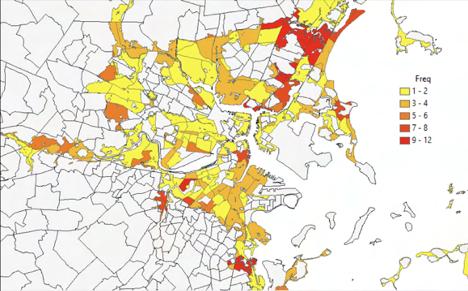

Who's at Risk in a Changing Climate? Mapping Electricity-Dependent Patient PopulationsinaCoastalCity Webb,Balaji,Nathanson,Balsari,Dresser.
Rhode Island Medical Journal,2021
What we found: a quarter of the patients at a major hospital in a coastal city who use home nebulizers are in locations that would beatriskoffloodinginamajorhurricane.
Why it matters: patients who rely on electricity-powered medical equipment are vulnerable to climate shocks that disrupt criticalutilities.Healthcaresystemsandcities need to be prepared to meet the needs of this population during hurricanes and other disruptiveeventslinkedtoclimatechange.
Designing digital health applications for climatechangemitigationandadaptation Lokmic-Tomkins, Borda,Humphrey
The Medical Journal of Australia,2023
What we say: environmentally responsible digitalhealthdependsontransformationof care models and health system infrastructurestoembed“green”approaches to routine practice along the continuum of design, implementation, evaluation, and consumeruse.
Whyitmatters:digitalhealthcanpositively contribute to climate action if implemented and maintained with environmental sustainabilityinmind.
ExtramuralUSFederalResearchGrantsFor Health Outcomes Associated With Climate Change Inadequate, Too Narrow In Focus. Sorensen, Dresser, Balakumar, Wheat, Yates, Healy, Brown, Butala, Lehmann, Malina,Redelmeier,Hess,Salas.
HealthAffairs,2023
What we found: federal funding for climate andhealthresearchbetween2010and2020 did not align with level of need or populationsthatarebelievedtobeatrisk.
Why it matters: measuring funding helps highlight gaps and provides an impetus for moreappropriatelevelsofinvestment.

Building capacity of healthcare professionals and community members to address climate and health threats in The Bahamas:Analysisofagreenclimatefund pilotworkshop.
Hamilton, Philippe, Hospedales, Dresser, Colebrooke, Hamacher, Humphrey, Sorensen.
DialoguesinHealth,2023.
What we found: a climate and health workshop led to increased awareness of climate health threats amongst healthcare workersandmembersofcivilsociety.
Why it matters: this study provides support fortheusefulnessofsensitizationworkshops on climate change and health for mixed professionalaudiences.


TheUnitedNationsFrameworkConvention on Climate Change (UNFCCC) 28th Conference of the Parties, Dubai (COP28): Implicationsforlungdisease.
Beggs,Oliveira, Giudice. Respirology,2024
Whatwesay:Healthcareprovidershavethe opportunitytoeducatetheirpatientsonhow climate change and pollution can impact their respiratory health, and how to stay healthy during heat waves, other weather extremes, and periods of elevated air pollution.
Why it matters: the present moment offers anopportunitytodecarboniseourhealthcare sectorandinvestinadaptationstrategies.

Evidence-Based Heatstroke Management intheEmergencyDepartment.
Rublee, Dresser, Giudice,Lemery,Sorenson. Western J of Emergency Medicine,2021
What we found: evidence supports rapid identification and cooling of heatstroke patients. Early measurement of core body temperature and immersion cooling should beprioritized.
Why it matters: acute management of heatstroke can save lives and improve outcomes. The diagnostic and management algorithmwedevelopedprovidesaroadmap for health professionals and healthcare systemsworkingtooptimizecareforpeople who experience this exquisitely timesensitiveemergency.

The Climate and Human Health Fellowship hasastrongtraditionofpublicengagement on climate change, its health impacts, and stepsthatcanbetakentoaddressthem.Our faculty and fellows have participated in legislativebriefings,amicusbriefs,andother formal procedures for educating key decision-makers on the health impacts of climatechange.
Fellowshavealsoparticipatedinexternships with federal agencies, academic journals, and nonprofit organizations. Through these experiences, they have been able to participate in the development of policy guidance documents, resilience toolkits, academic publishing initiatives, and educational materials. Fellows gain firsthand exposure to how key organizations take action at the intersection of climate change and health - experience that helps preparethemforfutureleadershiproles.
Past and present fellows have engaged in research collaborations, education activities, externships, or other activities with the followingorganizations:
U.S. Centers for Disease Control and Prevention(CDC)
U.S.OfficeofClimateChangeandHealth Equity(HHS)
National Institute of Environmental HealthSciences(NIEHS) Americares CrisisReady
The Journal of Climate Change and Health
GlobalConsortiumonClimateandHealth Education
University of Colorado Climate Medicine Program
Communities Responding to Extreme Weather(CREW)
ResilientMysticCollaborative MysticRiverWatershedAssociation

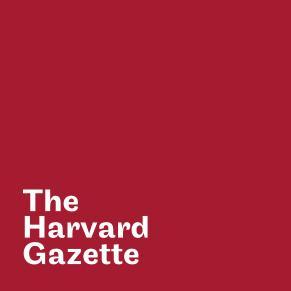




































We thank the following organizations for their generous support for our fellowship program and supporting research projects undertaken by members of our team. The Climate and Health Foundation provided generous seed funding to support the creationofthefellowship.


We also thank the following academic centers and nonprofit organizations, which have provided a welcoming learning environment and additional support for our fellows.
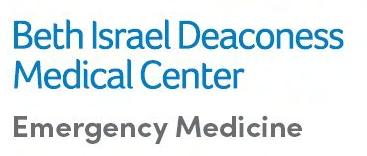







TheFellowshipinClimateandHumanHealth is designed to prepare physicians for leadershiprolesattheintersectionofclimate change,health,andhealthcare.
We recognize that physicians at different points in their career who come from differentpartsoftheworldmayhavevarying educationalneeds.Asaresult,wenowoffer avarietyoffellowshipformatsforapplicants interestedinreceivingdedicatedclimateand health education while taking advantage of the rich in-person learning, research, and networking opportunities at our Harvardaffiliated teaching hospital and collaborating centers across Harvard's campus.
Prospectiveapplicantswhoareinterestedin learning about the Physician Fellowship in ClimateChangeandHumanHealthcanview current fellowship format options and learn more about the application process on our websitebyscanningthisQRcode:
https://www.climateandhumanhealth.org